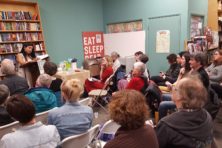Finding My Way As A Reader, Writer with Write On
- Share
- Tweet
- Pin
- Share

by Janis Falk
A recent transplant to Door County, I began exploring beyond the obvious, seeking opportunities to engage in the art community. In creative endeavors I wield the mighty pen, or keyboard as it were. Writing, unlike other art forms, is an alone activity.
Some writers, like most humans, crave community, which is exactly what I found at Write On, Door County. I jumped in and attended several of the programs offered by this terrific organization.
One full-day seminar titled “Beyond Show Don’t Tell” is my favorite to date of the many I have attended. The seminar, led by a partner in a publishing firm, delved into details of elevating writing to a quality level worthy of publication. Hanna Kjeldbjerg shared telltale signs publishers seek when reviewing manuscripts. We exercised our writing skills with short assignments and critiqued as a group. Kjeldbjerg’s program focused on booting writers out of their own head and adopting the reader’s perspective. Emphasis was placed on “showing with a purpose” and many examples were discussed exemplifying mediocre writing enriched to really good writing by addition of a phrase. Exact content from the program is difficult to share because learning occurred though illustration by comparing snippets of writing.
In terms of character development, Kjeldbjerg suggested using questionnaires available online to completely round out a character in your mind even if the details are not actually used in your prose. Where and in what type of household did your character grow up? These “facts” may never be revealed per se in your story but knowledge of them in your own mind will assist in psychological character development. A child of poverty may not be able to throw away anything of value or a child of a hoarder may be a minimalist. In a murder mystery, this information could help define where and how a weapon or other evidence is discovered.
Undisclosed character background can also affect dialogue. Kjeldbjerg reminded us to change up vocal styles in dialogue to match the speaker. I fall guilty to writing dialogue in my own speech pattern and, prior to submitting a manuscript will need to edit dialogue accordingly. Most prose writers have an opinion regarding use of dialogue tags: “he said,” “she commented” and the like. Some say never use them, some say to do so sparingly and some say always use them so readers are not confused about who is speaking. Kjeldbjerg illustrated through examples how to enhance dialogue tags through description of expression, body language and gestures, either of the speaker or the listeners.
Over lunch provided by Write On, Door County we discussed our writing projects and became acquainted, or in the case of a few repeats, reacquainted. Regardless of our styles, which included children’s literature, retro Beat Generation free form and mystery novels, we shared our trials and tribulations. Kjeldbjerg frequently interjected advice specific to each person’s situation. A most pleasant surprise arrived when Kjeldbjerg revealed our seminar participation included a free two-hour editorial consultation from her firm. This gift is a fledgling writer’s dream.
Wrapping up the seminar Kjeldbjerg addressed the dreaded edit. Kjeldbjerg quoted from a dictionary the meaning of polishing. Paraphrasing here, polishing means to make shiny with friction; smoothing out bumps. I like this image and will keep it in the forefront of my mind when revising becomes tedious.
Writers are generally readers. Upon relocating to Door County, I was also looking for a book club. I am not much of a book club person in that I like to read what I like to read and tend to binge on topics. Write On, Door County introduced me to the Great Lakes/Great Book Club, which meets monthly at the Door County Maritime Museum. I read books I never would have uncovered and learned about commercial shipping, commercial fishing, invasive species and water wars. Guest speakers arranged for by Write On have included authors of the books we have read and even a ship’s captain. Our discussions centered on the Great Lakes but often drifted toward water quality and environmental topics. We frequently debated the appropriateness of Lake Michigan water diversion projects and developed new friendships.
Writers can be herd animals at times. Belonging to a writers group has been endorsed and panned by the writers’ trade media. Like life, a person benefits proportionately to investment. While not sponsored officially by Write On, Door County, the writers group of which I am a member was referred to me by the organization, which can be a clearinghouse of information for aspiring writers as well as readers.
So, only one year after replanting my roots in Door County, I feel comfortably implanted in the local community. I am most grateful to Write On, Door County for providing fertile ground.
Peninsula Arts and Humanities Alliance, Inc., which contributes Culture Club throughout the summer season, is a coalition of nonprofit organizations whose purpose is to enhance, promote and advocate the arts, humanities and natural sciences in Door County.



